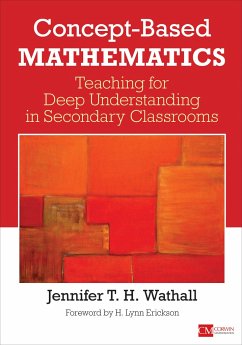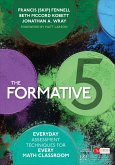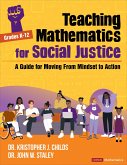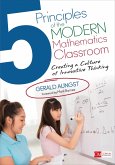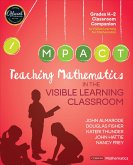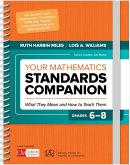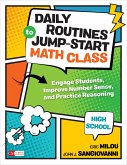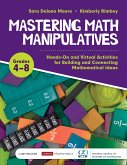- Broschiertes Buch
- Merkliste
- Auf die Merkliste
- Bewerten Bewerten
- Teilen
- Produkt teilen
- Produkterinnerung
- Produkterinnerung
This book is filled with the practical tools needed to move from teaching memorization and routine processes to teaching maths in a deep, clear, and meaningful way.
Andere Kunden interessierten sich auch für
![The Formative 5 The Formative 5]() Francis M. FennellThe Formative 524,99 €
Francis M. FennellThe Formative 524,99 €![Teaching Mathematics for Social Justice, Grades K-12 Teaching Mathematics for Social Justice, Grades K-12]() Kristopher J. ChildsTeaching Mathematics for Social Justice, Grades K-1240,99 €
Kristopher J. ChildsTeaching Mathematics for Social Justice, Grades K-1240,99 €![5 Principles of the Modern Mathematics Classroom 5 Principles of the Modern Mathematics Classroom]() Gerald W. Aungst5 Principles of the Modern Mathematics Classroom32,99 €
Gerald W. Aungst5 Principles of the Modern Mathematics Classroom32,99 €![Teaching Mathematics in the Visible Learning Classroom, Grades K-2 Teaching Mathematics in the Visible Learning Classroom, Grades K-2]() John T. Almarode (USA James Madison University)Teaching Mathematics in the Visible Learning Classroom, Grades K-240,99 €
John T. Almarode (USA James Madison University)Teaching Mathematics in the Visible Learning Classroom, Grades K-240,99 €![Your Mathematics Standards Companion, Grades 6-8 Your Mathematics Standards Companion, Grades 6-8]() Ruth Harbin MilesYour Mathematics Standards Companion, Grades 6-839,99 €
Ruth Harbin MilesYour Mathematics Standards Companion, Grades 6-839,99 €![Daily Routines to Jump-Start Math Class, High School Daily Routines to Jump-Start Math Class, High School]() Eric MilouDaily Routines to Jump-Start Math Class, High School42,99 €
Eric MilouDaily Routines to Jump-Start Math Class, High School42,99 €![Mastering Math Manipulatives, Grades 4-8 Mastering Math Manipulatives, Grades 4-8]() Sara Delano MooreMastering Math Manipulatives, Grades 4-839,99 €
Sara Delano MooreMastering Math Manipulatives, Grades 4-839,99 €-
-
-
This book is filled with the practical tools needed to move from teaching memorization and routine processes to teaching maths in a deep, clear, and meaningful way.
Hinweis: Dieser Artikel kann nur an eine deutsche Lieferadresse ausgeliefert werden.
Hinweis: Dieser Artikel kann nur an eine deutsche Lieferadresse ausgeliefert werden.
Produktdetails
- Produktdetails
- Corwin Mathematics Series
- Verlag: SAGE Publications Inc
- Seitenzahl: 296
- Erscheinungstermin: 24. Februar 2016
- Englisch
- Abmessung: 253mm x 176mm x 22mm
- Gewicht: 570g
- ISBN-13: 9781506314945
- ISBN-10: 1506314945
- Artikelnr.: 43603081
- Herstellerkennzeichnung
- Libri GmbH
- Europaallee 1
- 36244 Bad Hersfeld
- gpsr@libri.de
- Corwin Mathematics Series
- Verlag: SAGE Publications Inc
- Seitenzahl: 296
- Erscheinungstermin: 24. Februar 2016
- Englisch
- Abmessung: 253mm x 176mm x 22mm
- Gewicht: 570g
- ISBN-13: 9781506314945
- ISBN-10: 1506314945
- Artikelnr.: 43603081
- Herstellerkennzeichnung
- Libri GmbH
- Europaallee 1
- 36244 Bad Hersfeld
- gpsr@libri.de
Jennifer Wathall has been a teacher of mathematics for over 20 years. She graduated from the University of Sydney with a BSC majoring in Mathematics and she has completed postgraduate studies at The University of Hong Kong. She has worked in several international schools including South Island School, Hong Kong, The United Nations International School (UNIS, one of the original IB schools), New York and she is currently working at Island School, Hong Kong as Head of Mathematics. She is currently an honorary faculty advisor and part time instructor for The University of Hong Kong. In the international arena she has presented workshops such as "How to Effectively Integrate Multimedia into the Classroom" at the 21st Century Conference in Hong Kong and Shanghai and The Asian Technology Conference in Mathematics, Bangkok and Beijing. She has also given talks around Asia about how to effectively integrate a 1:1 program into the mathematics classroom. ?As a qualified International Baccalaureate workshop leader ("Mathematics, Concepts and Inquiry in the Diploma Program and Approaches to Teaching and Learning") Jennifer has delivered numerous workshops in the Asia Pacific region. Her role as a field representative for the IB Asia Pacific serves as part of the quality assurance framework. She has consulted on IB Mathematics textbooks and has developed a Category 3 workshop on "The Use of the Casio GDC in IB Mathematics". In 2014 she was invited to deliver a talk at the IB Asia Pacific Conference titled "Using Inquiry in the IB Mathematics Classroom" and in 2015 Jennifer will be presenting at the IB Americas annual conference. She is a certified trainer in the DISCtm behavior assessment tool and a certified independent consultant in "Concept Based Curriculum Design" by Dr H. Lynn Erickson. Jennifer works as a consultant helping math departments and schools transition to concept-based curriculum and instruction. She utilizes her skills as a certified Performance Coach to facilitate transition and change. For 2014 to 2019 she will be part of the external curriculum review group for IB Diploma Mathematics based in The Hague and Cardiff. ?Currently she is working with schools to transition towards a concept and inquiry based curriculum.
Preface
I. What is Concept-Based Curriculum and Instruction in Math? Research and
Theory
1. Why Is It Important for My Students to Learn Conceptually?
2. What Are the Facts, Processes, and Concepts in Mathematics?
II. How to Craft Generalizations and Plan Units of Work to Ensure Deep
Conceptual Understanding? A Practice Guide
3. How Do I Craft Generalizations for Mathematics?
4. How Do I Plan Units of Work for a Concept-Based Curriculum?
III. How Do We Engage Students Through Instructional Practice? Strategies
to Engage and Assess
5. How Do I Captivate Students? Eight Strategies for Engaging the Hearts
and Minds of Students
6. How Do I Know My Students Understand the Concepts? Assessment Strategies
7. How Do I Integrate Technology to Foster Conceptual Understanding?
8. What Do Ideal Concept-Based Math Classrooms Look Like?
I. What is Concept-Based Curriculum and Instruction in Math? Research and
Theory
1. Why Is It Important for My Students to Learn Conceptually?
2. What Are the Facts, Processes, and Concepts in Mathematics?
II. How to Craft Generalizations and Plan Units of Work to Ensure Deep
Conceptual Understanding? A Practice Guide
3. How Do I Craft Generalizations for Mathematics?
4. How Do I Plan Units of Work for a Concept-Based Curriculum?
III. How Do We Engage Students Through Instructional Practice? Strategies
to Engage and Assess
5. How Do I Captivate Students? Eight Strategies for Engaging the Hearts
and Minds of Students
6. How Do I Know My Students Understand the Concepts? Assessment Strategies
7. How Do I Integrate Technology to Foster Conceptual Understanding?
8. What Do Ideal Concept-Based Math Classrooms Look Like?
Preface
I. What is Concept-Based Curriculum and Instruction in Math? Research and
Theory
1. Why Is It Important for My Students to Learn Conceptually?
2. What Are the Facts, Processes, and Concepts in Mathematics?
II. How to Craft Generalizations and Plan Units of Work to Ensure Deep
Conceptual Understanding? A Practice Guide
3. How Do I Craft Generalizations for Mathematics?
4. How Do I Plan Units of Work for a Concept-Based Curriculum?
III. How Do We Engage Students Through Instructional Practice? Strategies
to Engage and Assess
5. How Do I Captivate Students? Eight Strategies for Engaging the Hearts
and Minds of Students
6. How Do I Know My Students Understand the Concepts? Assessment Strategies
7. How Do I Integrate Technology to Foster Conceptual Understanding?
8. What Do Ideal Concept-Based Math Classrooms Look Like?
I. What is Concept-Based Curriculum and Instruction in Math? Research and
Theory
1. Why Is It Important for My Students to Learn Conceptually?
2. What Are the Facts, Processes, and Concepts in Mathematics?
II. How to Craft Generalizations and Plan Units of Work to Ensure Deep
Conceptual Understanding? A Practice Guide
3. How Do I Craft Generalizations for Mathematics?
4. How Do I Plan Units of Work for a Concept-Based Curriculum?
III. How Do We Engage Students Through Instructional Practice? Strategies
to Engage and Assess
5. How Do I Captivate Students? Eight Strategies for Engaging the Hearts
and Minds of Students
6. How Do I Know My Students Understand the Concepts? Assessment Strategies
7. How Do I Integrate Technology to Foster Conceptual Understanding?
8. What Do Ideal Concept-Based Math Classrooms Look Like?

